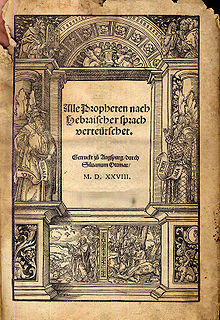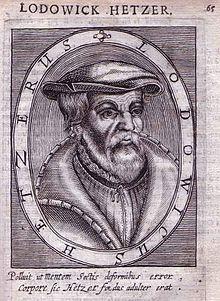
Ludwig Haetzer (also Ludwig Hetzer, Ludwig Hätzer and sometimes Ludwig Hatzer) (1500 – 4 February 1529) was an Anabaptist.
Born in Bischofszell, Thurgau, Switzerland, he wrote an article against the uses of images in worship, translated some Latin evangelical texts regarding the conversion of Jews, and, together with Hans Denck, he translated the prophets of the Bible into German in 1528. Haetzer also wrote a booklet discouraging the consumption of alcohol. He regarded Jesus as a leader and teacher only; not divine and not an object of worship, therefore an anti-trinitarian and possibly a Unitarian.[1]
Haetzer attended the Martyrs' Synod in Augsburg. He was executed for his Anabaptist radicalism by beheading in Konstanz, Germany, on 4 February 1529, technically for adultery.
See also
- George Blaurock
- Conrad Grebel
- Balthasar Hubmaier
- Jacob Kautz
- Felix Manz
- Adam Pastor
References
- ^ J. F. Gerhard Goeters, J. F. Ludwig Hätzer (ca. 1500 bis 1529), Spiritualist und Antitrinitarier, eine Randfigur der frühen Täuferbewegung (Gütersloh, 1957).
External links
- Haetzer, Ludwig (1500-1529) at Global Anabaptist Mennonite Encyclopedia Online
- Ludwig Hetzer at Britanica
- Some biographical details
